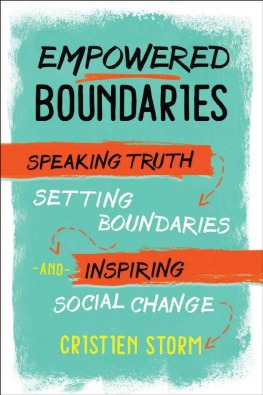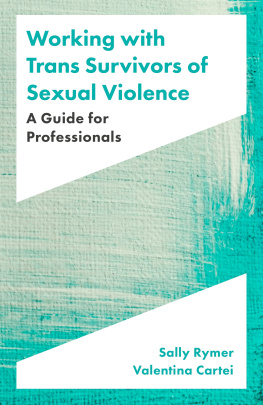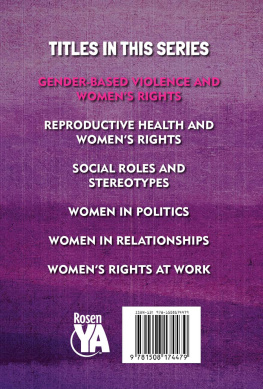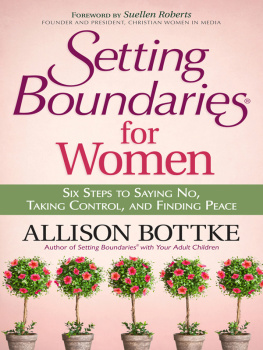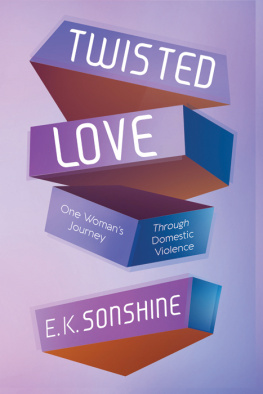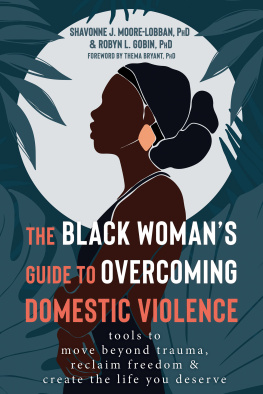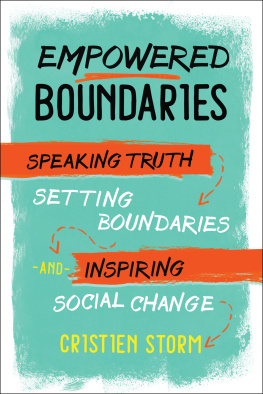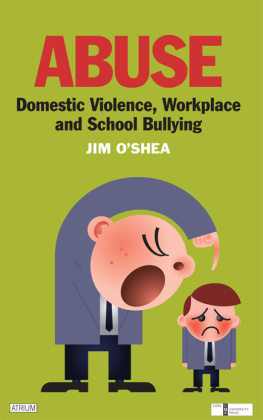CONTENTS
List of Tables
List of Illustrations
Guide
Pages
Empowered Boundaries
Speaking Truth, Setting Boundaries, and Inspiring Social Change
Cristien Storm
Praise for Empowered Boundaries
Storm outlinesquite comprehensivelywhat it means to have a dynamic self in relationship to others that is both honoring of ourselves and conscious of our coexistence with others. Empowered Boundaries is practical and soulful and an impressive contribution to many different lineages of thoughtpsychology, social movements, and social justice education.
Liz Goodwin, coauthor with Leticia Nieto of Beyond Inclusion, Beyond Empowerment: A Developmental Strategy to Liberate Everyone
With a history steeped in self-defense, decades worth of de-escalation skills, and a lifelong interest in the nefarious workings of white nationalists, Cristien Storm is the absolute perfect person to write this timely and important book.
Inga Muscio, author of Cunt: A Declaration of Independence, Autobiography of a Blue-Eyed Devil: My Life and Times in a Racist Imperialist Society, and Rose: Love in Violent Times
Cristien Storms Empowered Boundaries couldnt come at a better time. In an era of bully culture, when decisions often get made by those who dont hesitate to take what they want, while the rest of us keep worrying whether pushing back might make it worse, Storm shows us how to say, Enough! We are lucky to have such a ferocious fighter and such a loving listener in our midst and even luckier that she has shared her hard-won wisdom to help us train our minds, our hearts, and our fists to claim the space for lives worth living.
Shon Meckfessel, author of Nonviolence Aint What It Used to Be: Unarmed Insurrection and the Rhetoric of Resistance
This hands-on guide to setting and upholding strong boundaries belongs on everyones bookshelf. It brings together Cristien Storms experience teaching womens self-defense, organizing against white nationalism, creating art, and supporting people in their personal healing to create an eminently readable resource to developing the skills and tools we need to be happy, whole, and safe. This is an inviting, practical, and essential book.
Dan Berger, associate professor of comparative ethnic studies at the University of Washington at Bothell, coauthor with Toussaint Losier of Rethinking the American Prison Movement, and author of The Struggle Within: Prisons, Political Prisoners, and Mass Movements in the United States
Copyright 2018 by Cristien Storm. All rights reserved. No portion of this book, except for brief review, may be reproduced, stored in a retrieval system, or transmitted in any form or by any meanselectronic, mechanical, photocopying, recording, or otherwisewithout the written permission of the publisher. For information, contact North Atlantic Books.
Published by
North Atlantic Books
Berkeley, California 94712
Cover design by Jasmine Hromjak
Book design by Happenstance Type-O-Rama
Printed in the United States of America
Empowered Boundaries: Speaking Truth, Setting Boundaries, and Inspiring Social Change is sponsored and published by the Society for the Study of Native Arts and Sciences (dba North Atlantic Books), an educational nonprofit based in Berkeley, California, that collaborates with partners to develop cross-cultural perspectives, nurture holistic views of art, science, the humanities, and healing, and seed personal and global transformation by publishing work on the relationship of body, spirit, and nature.
North Atlantic Books publications are available through most bookstores. For further information, visit our website at www.northatlanticbooks.com or call 800-733-3000.
Library of Congress Cataloguing-in-Publication data is available from the publisher upon request.
Acknowledgments
I t is with the love, support, and commitment of so many people that projects such as this are brought into the world. I would like to thank some of those people here. I want to thank Alison Knowles for reaching out and believing in this book and Ebonie Ledbetter and Julia Sadowski, as well as everyone at North Atlantic Books for making Empowered Boundaries happen. Barbara Sjoholm, thanks so much for your support, insight, suggestions, and editing. Deborah May Wilk, thank you for walking with me on my most challenging journeys; you are one fantastic mentor. Steve Payne, thank you for being a solid support beam in the early days of Home Alive.
Home Alive founders Julie Hasse, Gretta Harley, Stacey Wescott, Valerie Agnew, Zoe Bermet, Lara Kidoguchi, Jessica Lawless, and Mich Levyyou all helped create an organization, a mindset, and nurtured the seeds for this book. Thank you also to each and every Home Alive staff member, volunteer, collective member, instructor, board member, and supporterthank you for showing up and doing the work. Ajax, thank you for always being there. Thank you to all the people who have supported me over the years in so many ways. I am grateful to those of you who have challenged me, loved me, pushed me, hugged me, performed with me, and taught me things I may or may not have wanted to know. Thank you to all the trainers, organizers, activists, writers, dreamers, and each and every one of you who work to make this world a better place.
Prologue
A s this book comes to print, mainstream America is being introduced to white nationalism, a dangerous social movement whose genocidal vision is the creation of a white homeland through the removal of all people of color, all Jewish people, and any dissenters. Its attempted ascension is focused on occupying the State in order to build a white ethnic nation state.
What does this have to do with boundaries?
Our boundaries are political whether we want them to be or not. Our boundaries, whether they are set via action or inaction, whether they are proactive or reactive, establish the culture and sensibilities of our relationships and the spaces we move through. When we do not respond to a sexist comment, for example, the space becomes one in which sexism can expand, which in turn creates conditions where escalating sexist behaviors are more possible. However, if we can assert a clear boundary in the face of a sexist comment, we demark that space as one where sexism is not tolerated. Boundaries then, are not just individual and interpersonal but social as well. What this means is that boundaries are important, not only for how we move through the world as individuals but also for how we create, nurture, respond to, and shape the spaces we inhabit. Therefore, our boundaries are not just about responding to individual interactions, but also about envisioning and creating the kinds of communities we want to live in. This may involve responding to a discriminatory comment, agitating for systemic change in a work environment, promoting underrepresented leadership, building solidarity between grassroots organizing projects, supporting local community-based groups, becoming active in neighborhood actions, and/or joining political movements for social justice. This is not in any way an attempt to blame those who are experiencing oppressions for not responding the right way or an attempt to blame the cause of sexism on a lack of good boundaries. Let me be clear: sexism, like racism, homophobia, and gender bias, is systemic and rooted in both white nationalism and white supremacy. In addition, I do not want to imply that everyone has to respond to every hateful or oppressive comment or behavior. We must all pick and choose our battles, which are informed by our resources, abilities, accessibilities, safety, family history, support networks, and a million other aspects that contribute to who and how we are in the world.

